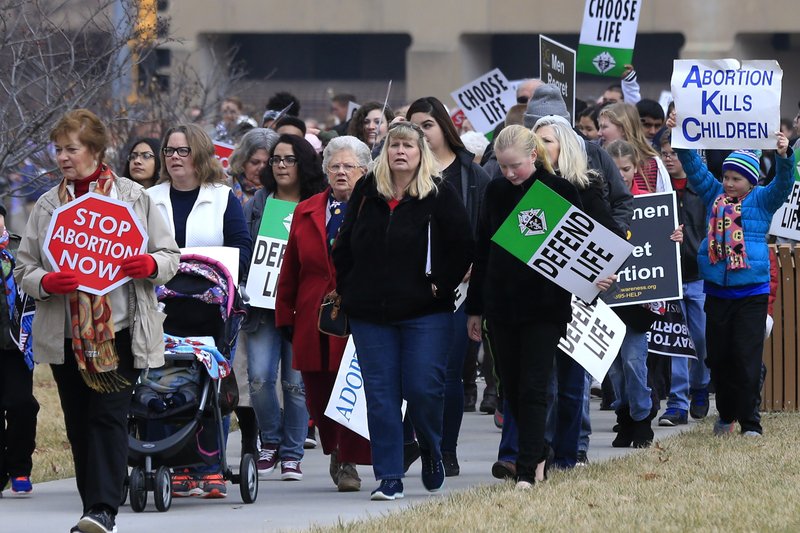TOPEKA, Kan. -- Supporters of a proposed anti-abortion amendment to the Kansas Constitution announced Thursday that they want to put the measure on the August primary ballot. The proposal is aimed at overturning last year's Kansas Supreme Court decision upholding abortion rights.
But some moderate Republicans in the Republican-controlled Legislature oppose putting the proposal on the primary ballot, arguing that such an important question should be settled in the highest-turnout election possible. They also face the prospects of a ballot question in August that could drive conservative voters to the polls, making it harder for moderate GOP candidates to win primary races.
"That has occurred to some of us -- yes, it has," said state Rep. Don Hineman, a moderate Republican from western Kansas who lost the House majority leader's position after conservatives gained clout in the 2018 elections.
Kansans for Life and other anti-abortion groups outlined the proposed amendment Thursday. Abortion opponents need two-thirds majorities in both chambers to put it on the ballot. Voters would then have to approve the measure with a simple majority. Lawmakers pick the election date.
Election-year politics already hang over the debate. All 40 state Senate and 125 state House seats are on the ballot this year, with moderates hoping to gain clout within the GOP and Democrats looking to break Republican super majorities.
Also, a hotly contested Republican primary for an open U.S. Senate seat is likely to draw conservatives to the polls in August.
"That is an ongoing conversation people have," said state Rep. Tom Cox, a moderate Republican who backs an amendment and says he doesn't have a preferred date. "It likely hurts Democrats if it's on the general, and it likely hurts moderate Republicans if it's on the primary."
The Legislature has had solid anti-abortion majorities for two decades, but both sides say the vote among lawmakers on a proposed constitutional change could be close. Abortion opponents last year barely failed to override Democratic Gov. Laura Kelly's veto of a bill to require abortion providers to tell patients about a disputed treatment to stop a medication abortion once it has started.
Kansans for Life and GOP leaders are trying to stymie any push for an abortion ban, fearing it would fail.
"Whether it's the general or the primary, it's whatever has the best chance of passing," said House Majority Leader Dan Hawkins, a conservative. "We want to get it passed."
The Kansas Supreme Court ruling in April declared access to abortion a "fundamental" right under the state's Bill of Rights. Abortion opponents are afraid that if they fail to change the state constitution, state courts will invalidate a raft of abortion restrictions enacted over the past decade before Kelly, an abortion-rights supporter, took office a year ago.
The proposed amendment is modeled after one approved by Tennessee voters in 2014. It declares that the state constitution does not "secure" a right to abortion and legislators may pass laws to restrict or regulate abortion, except as limited by the U.S. Constitution.
Jeanne Gawdun, a Kansans for Life lobbyist, said before the news conference that the group wants to make sure that the issue doesn't get lost among other election issues. That's less likely in the primary, she said.
"Kansans are very passionate about this issue and so they deserve to have an opportunity to vote on it and on a ballot where it's not going to be buried, on a long ballot, down at the bottom," Gawdun said.
Some abortion-rights supporters believe they have a better chance of defeating the amendment in a general election, partly because far more unaffiliated voters participate.
In fact, Rep. John Carmichael, a Democrat who supports abortion rights, said: "They'll lose the amendment in the general."
Turnout is certain to be higher in the general election, when President Donald Trump is on the ballot. In 2016, the last presidential election year, the primary turnout was 22%, compared with a general election turnout of 67%.
"If you want to get a broader perspective of how the state feels, you probably want to put in an election where you have more voters voting," said Rep. Brenda Dietrich, a moderate Republican.
Rachel Sweet, a lobbyist for abortion provider Planned Parenthood Great Plains, called putting the question on the primary ballot a "cynical" move designed only to increase its chances of passing by limiting voter participation.
A Section on 01/17/2020

